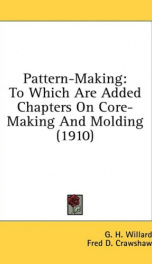pattern making

Purchase of this book includes free trial access to www.million-books.com where you can read more than a million books for free. This is an OCR edition with typos. Excerpt from book: CHAPTER III WOODS PATTERN-MAKERS use several kinds of wood, pine, mahogany, baywood, cherry, Washington fir, beech, maple and whitewood being the principal ones. Each wood has some5 particular advantage over the others for the purpose for which it is used. For general pattern work white pine leads them all in the opinion of American patternmakers. It is soft, easy to work into shape with edged tools, is light, and does not have that tendency to curl and twist that some other woods have. Whitewood and fir are being substituted for pine, however, because of the scarcity and price of pine. Lignum-vitae, black walnut, etc., are very hard on edge tools, and are used only for patterns which are to be used over and over again. The grain on pine ordinarily runs straight. It is not brittle nor easy to sliver up as in the case of some soft woods like redwood or California cedar. When picking out lumber in the yard or at the lumber racks in the shop, always get a dry and straight-grained board. A soft, dry board that is very light and shows no. signs of pitch is a good board to pick out. If it is not dry and well seasoned it will cause no endof trouble, because it will shrink, check or crack. "Season-dried stock" seems to work better and has more "life" in the board than ordinary yard stock. Wide boards are apt to be the best, and the expert can tell after a little experience by rapping a board whether it is good or not. A knot or two does not do much harm, and all pattern-makers say that a few wormholes indicate good wood. It may be noticed in a lumber yard that the ends of boards and planks are sometimes painted. This is mostly on cheap stock. Fine lumber seasoned and dried well does not have the ends painted. In a good sound plank deposits of sap are formed around the pores, s...
Info about the book
Author:
Series:
Unknown
ISBN:
0470291125
Rating:
5/5 (2)Your rating:
0/5
Languge:
English
Users who have this book
Users who want this book
What readers are saying
What do you think? Write your own comment on this book!
write a commentGenre
if you like pattern making try:
Other books by this author
Do you want to exchange books? It’s EASY!
Get registered and find other users who want to give their favourite books to good hands!

